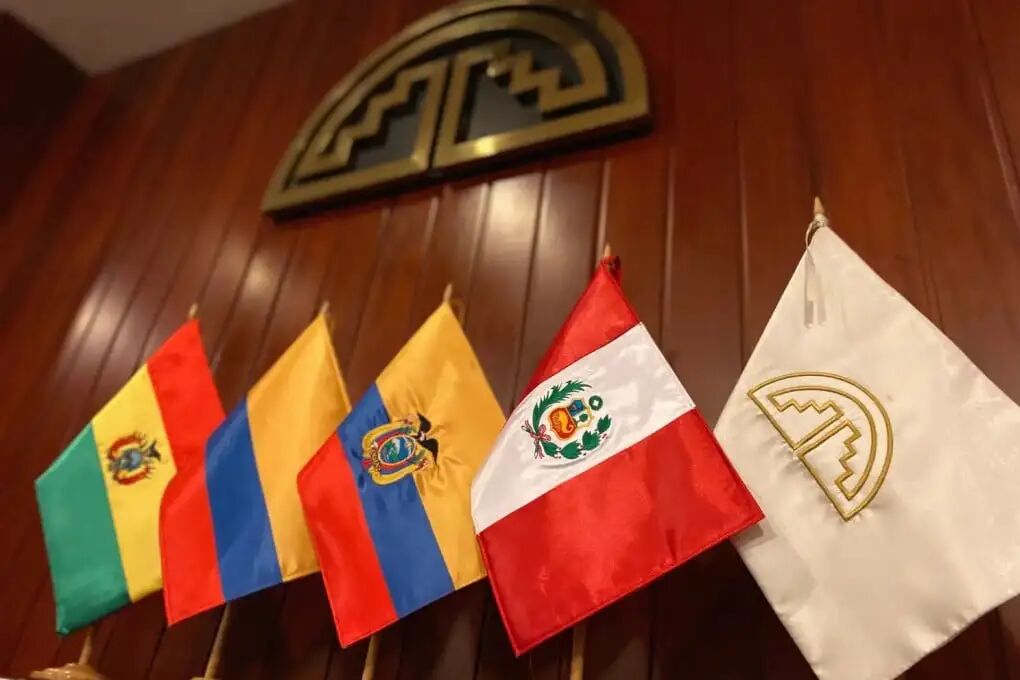作者:Dewey Sim 发布时间:2025-10-09 来源:南华早报+收藏本文
近日,第31次安第斯共同体(安共体)外长理事会例行会议在哥伦比亚首都波哥大举行,会议表决一致通过决议,正式接纳中国为该组织观察员国,标志着中国与拉美关系进入了“新阶段”。
复旦大学金砖国家研究中心副主任、复旦发展研究院江天骄副教授接受南华早报采访时指出,这一身份将深化中国与拉美的经济投资联系,是“深化全球南方战略布局的关键一步”。他强调,中国通过制度化参与区域事务,不仅强化了发展中国家的共同话语权,更为拉美国家提供了对冲美国单边关税政策的合作平台。在此背景下,中国可借助安共体机制为拉美提供稳定的出口渠道,推动南南合作与多边秩序维护。此外,江天骄认为,此举将进一步增强中国在拉丁美洲及全球南方的影响力网络,为其全球大国地位提供制度支持,同时促进人工智能、电动汽车等产业与拉美丰富资源的互补共赢。以下为南华早报刊载原文。

China has formally joined a South American trade bloc as an observer in a move analysts said would strengthen its strategic foothold in the region and help power industries ranging from artificial intelligence to electric vehicles.
Xinhua reported last week that China had been formally accepted as an observer state of the Andean Community, a regional organisation comprising Bolivia, Colombia, Ecuador and Peru.
China has engaged with the Andean Community since 1999, when the two sides reached an agreement to set up consultative mechanisms. But it was only made an observer last Tuesday at a meeting in Colombia of foreign ministers from the member states.
Member states said China had “always played an important role in the international community and global governance” and that its admission as an observer state was “of great historical significance”, according to Xinhua.
The report added that member states “expressed their hope that this would promote bilateral cooperation, advance regional economic integration and sustainable development, and better safeguard the common interests of developing countries”.
China has stepped up its efforts to engage with Latin American economies in recent years, chiefly through its China-Community of Latin American and Caribbean States Forum.
At this year’s forum, held in Beijing in May and attended by leaders from the region, China’s main message was that it was a “good friend and partner” and that it would work with regional economies to boost development and stand up to “bullying” and unilateralism, phrases Beijing typically uses when referring to the US.
Jiang Tianjiao, associate director of the Centre for Brics Studies at Fudan University, said the development marked a “new phase” in relations between China and Latin America.
He believed China’s observer status would allow it to further deepen economic and investment ties with the region.
In addition, the Asian economic giant’s formal admission to the Andean Community was a “key step in deepening its strategic presence in the Global South”, Jiang added.
“This move not only signifies the deepening of China’s cooperation with Latin America but also strengthens the voice of developing countries through institutionalised participation in regional affairs.”
Beijing has consistently depicted itself as a leader of the developing world, with top officials pledging to defend the global order at a time when US President Donald Trump wages a tariff war on the world.
Jiang suggested China’s joining the South American bloc could help countries “counterbalance” the impact of Trump’s sweeping tariffs as economies were increasingly forced to seek alternative markets.
“As an observer state, China can provide more stable export channels for Latin America through a regional cooperation mechanism,” he added.
Against this backdrop, Jiang said Beijing’s new status could be viewed as a message by China and Andean Community states that they “believe that strengthening South-South cooperation and jointly maintaining the multilateral order will help counterbalance the effects of unilateral pressure from the United States”.
“China’s admission (as an observer state) will further enhance its network of influence across Latin America and the Global South, providing institutional support for its emerging status as a global power.”
Leland Lazarus, founder of Lazarus Consulting, which advises clients on China-Latin America relations, described the development as the latest example of China’s expanding influence in South America and said it would give Beijing “another avenue to push” its frameworks, including its recently launched Global Governance Initiative.
Chinese President Xi Jinping last month launched the initiative at the Shanghai Cooperation Organisation summit, saying the framework could improve global governance amid rapid changes and turbulence in the world.
Lazarus also said all four Andean Community members were rich in gold, copper and lithium, minerals that China would need to power industries ranging from artificial intelligence to electric vehicles for decades to come.
Rare earths and minerals have emerged as a pivotal front in the deepening competition between Beijing and Washington. Jiang said Bolivia’s lithium and Peru’s copper were “highly aligned” with the demands of China’s new energy industries.
“China is definitely taking advantage of the Trump administration’s aggressive tariff policies. At exactly the time when (Latin American) countries want to export more of their products to global markets, the Trump administration is hiking up trade barriers,” Lazarus said.
Recent American policies including its tariffs “fall right into China’s narrative that it is the more reliable, stable partner and that the US doesn’t have (other countries’) best interest at heart,” he added.
“In other words, China’s message is, ‘while the US is closing shop, we’re still open for business’.”